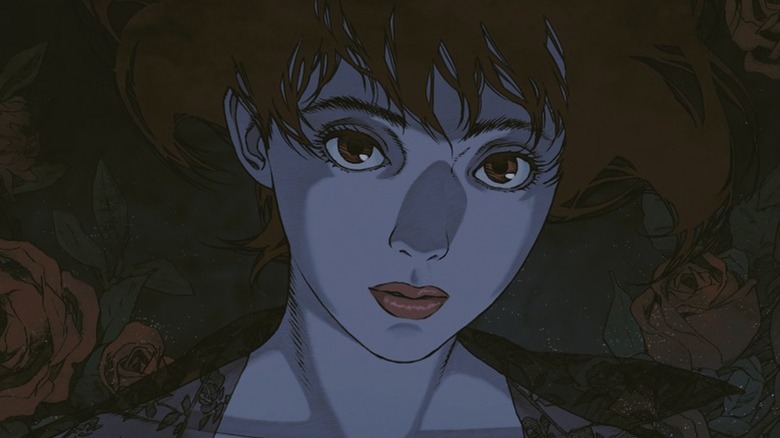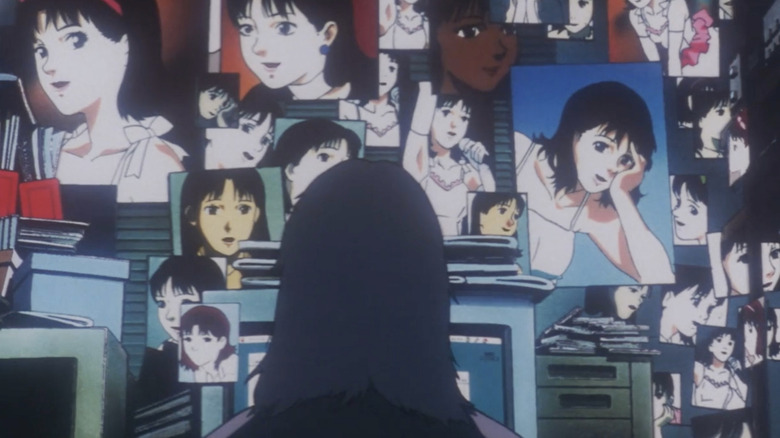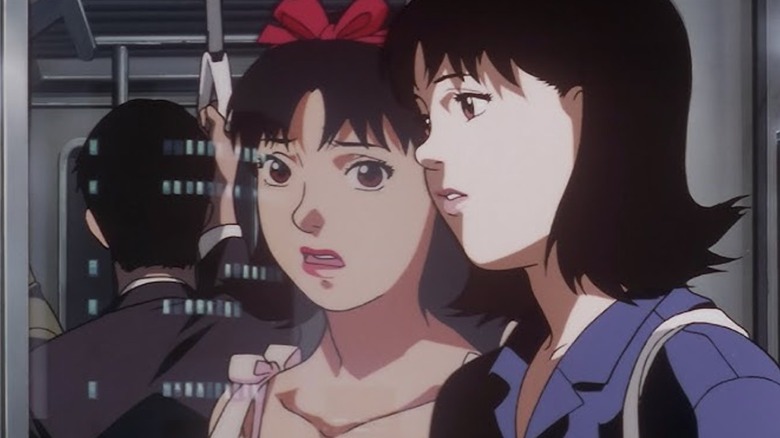One Legendary Anime Horror Movie Is Better (And Scarier) Than Ever
The 1997 psychological thriller "Perfect Blue" is ranked as one of the scariest animated movies ever and remains one of the greatest works of its director, the late Satoshi Kon, too. If you've never seen "Perfect Blue," now is a perfect time, because it has been remastered in 4K and is currently playing in theaters (distributed by GKIDS).
"Perfect Blue" follows a pop singer, Mima Kirigoe (Junko Iwao), who pivots to acting in new thriller TV series, "Double Bind." As she begins this career shift, Mima tries to balance her fans and agents' expectations with her own doubts about what kind of woman she wants to be. This all makes Mima suffer an identity crisis ... and it only gets creepier from there.
A stalker and obsessed Mima-fan wants his Mima, the innocent pop singer, back and reviles the new Mima for "replacing" her. People close to Mima's new career, like the screenwriter of her big break crime drama or a racy photographer, start showing up dead. Mima also learns that someone is posting as her on an internet fan site, "Mima's Room," someone who knows things only Mima herself should know.
"Perfect Blue" wasn't the first anime movie I ever loved, but it gave me such a high I finally dove into the medium. I've spent the last five years learning to love anime and "Perfect Blue" first showed me why I should try to. As /Film's BJ Colangelo put it, "Perfect Blue" is the type of movie that shows you how good animation can be.
The first time you see "Perfect Blue", it's meant to leave you bewildered; like Mima, you lose track of what's real and what isn't. Even when you rewatch and fit the pieces together, it's still terrifying to watch it all play out. I wince at every stabbing or burst of violence, which is all the more horrible and beautiful in the new remaster. While "Perfect Blue" rivals the best giallo, its scariest part is how it weaves that violence together with social commentary.
Perfect Blue predicted how scary internet fandom would get
"Perfect Blue" is specifically about Japan's entertainment industry, hence Mima starting as a pop idol, a type of celebrity rather specific to Japan. Yet the movie's commentary on that industry's exploitation of women is universal. Mima's big step to being taken "seriously" as an actress is to act in a rape scene; the assault isn't real, but in Kon's animated world, there's little boundary or visual distinction between the in-universe filmed scenes and reality. Mima's staged assault will have you sinking into your seat, trying to look away as much as if it were "real."
It's not just the talent management that exploits the stars. The movie opens at a concert where Mima and her singing group CHAM! are playing. Before we meet Mima, we hear fans in the crowd gossiping about her. Once CHAM! takes the stage, the movie cross cuts between Mima performing and her ordinary life, from grocery shopping to returning to her apartment. There are two Mimas, the "real" one and the dolled up pop idol she acts as for the public. Modern fame removes any dividing line between public and private, opening up both for spectacle and judgment.
Mima has to be taught how to use a computer during "Perfect Blue," a sign of how new the internet was when the movie was made... but that datedness only underlines the movie's prescience. The internet is a scary place. It can swallow up your brain, trapping you in fixations and negative thinking patterns if you keep a screen as your main company. It can offer a respite from loneliness, but truly doesn't solve it. Online, people can know you without you ever knowing them, because any conversation is easier to have when it's a one-way street.
The internet lets people choose how they perceive you
"Parasocial relationship" is often used to describe intense internet fandom and the stalker's fixation on Mima absolutely qualifies. He's obsessed with the version of her he's created, the one he hears inside his head talking back to him, and won't tolerate his idol changing. If she does, he'll lash out and punish that "betrayal."
Obsession and fandom existed before the internet, yes, but celebrities' internet presence gave us a peep-hole peek behind their public performances. It's all too easy for your love of a piece of art or a celebrity to turn into feelings of ownership or being owed for giving that love. It's especially easy for this to happen with musicians like Mima, because no form of art is more intimate to share than music. As you pop your headphones in, you're letting someone speak to you. A good song can give you the words to understand feelings you already had, blurring lines between yourself and the singer.
Most of us will never know fame like Mima does, but changing who you are to match what people expect of you? You don't need to be a pop star to understand that. Opening yourself up to the public now means putting yourself on the biggest stage of all, the internet, and if you let it, the online voice of legion will define who you are.
Mima spends the whole movie trying to find the answer to one question, the first line her character in "Double Bind" says: "Who are you?" Finding it nearly kills her and drives her insane — she's taunted throughout the movie by an image of her pop idol self, still dressed in a girlish but sexualized doll outfit. At the end of "Perfect Blue," she has her answer of who she is. Do you?
The remastered edition of "Perfect Blue" is currently playing in theaters.


